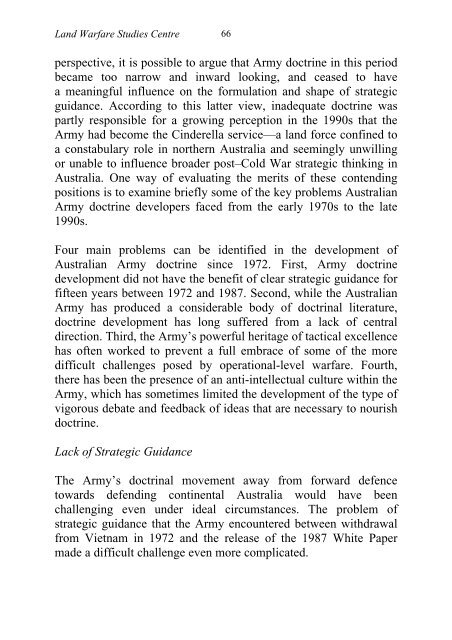Ibid - Australian Army
Ibid - Australian Army
Ibid - Australian Army
You also want an ePaper? Increase the reach of your titles
YUMPU automatically turns print PDFs into web optimized ePapers that Google loves.
Land Warfare Studies Centre 66<br />
perspective, it is possible to argue that <strong>Army</strong> doctrine in this period<br />
became too narrow and inward looking, and ceased to have<br />
a meaningful influence on the formulation and shape of strategic<br />
guidance. According to this latter view, inadequate doctrine was<br />
partly responsible for a growing perception in the 1990s that the<br />
<strong>Army</strong> had become the Cinderella service—a land force confined to<br />
a constabulary role in northern Australia and seemingly unwilling<br />
or unable to influence broader post–Cold War strategic thinking in<br />
Australia. One way of evaluating the merits of these contending<br />
positions is to examine briefly some of the key problems <strong>Australian</strong><br />
<strong>Army</strong> doctrine developers faced from the early 1970s to the late<br />
1990s.<br />
Four main problems can be identified in the development of<br />
<strong>Australian</strong> <strong>Army</strong> doctrine since 1972. First, <strong>Army</strong> doctrine<br />
development did not have the benefit of clear strategic guidance for<br />
fifteen years between 1972 and 1987. Second, while the <strong>Australian</strong><br />
<strong>Army</strong> has produced a considerable body of doctrinal literature,<br />
doctrine development has long suffered from a lack of central<br />
direction. Third, the <strong>Army</strong>’s powerful heritage of tactical excellence<br />
has often worked to prevent a full embrace of some of the more<br />
difficult challenges posed by operational-level warfare. Fourth,<br />
there has been the presence of an anti-intellectual culture within the<br />
<strong>Army</strong>, which has sometimes limited the development of the type of<br />
vigorous debate and feedback of ideas that are necessary to nourish<br />
doctrine.<br />
Lack of Strategic Guidance<br />
The <strong>Army</strong>’s doctrinal movement away from forward defence<br />
towards defending continental Australia would have been<br />
challenging even under ideal circumstances. The problem of<br />
strategic guidance that the <strong>Army</strong> encountered between withdrawal<br />
from Vietnam in 1972 and the release of the 1987 White Paper<br />
made<br />
a difficult challenge even more complicated.

















